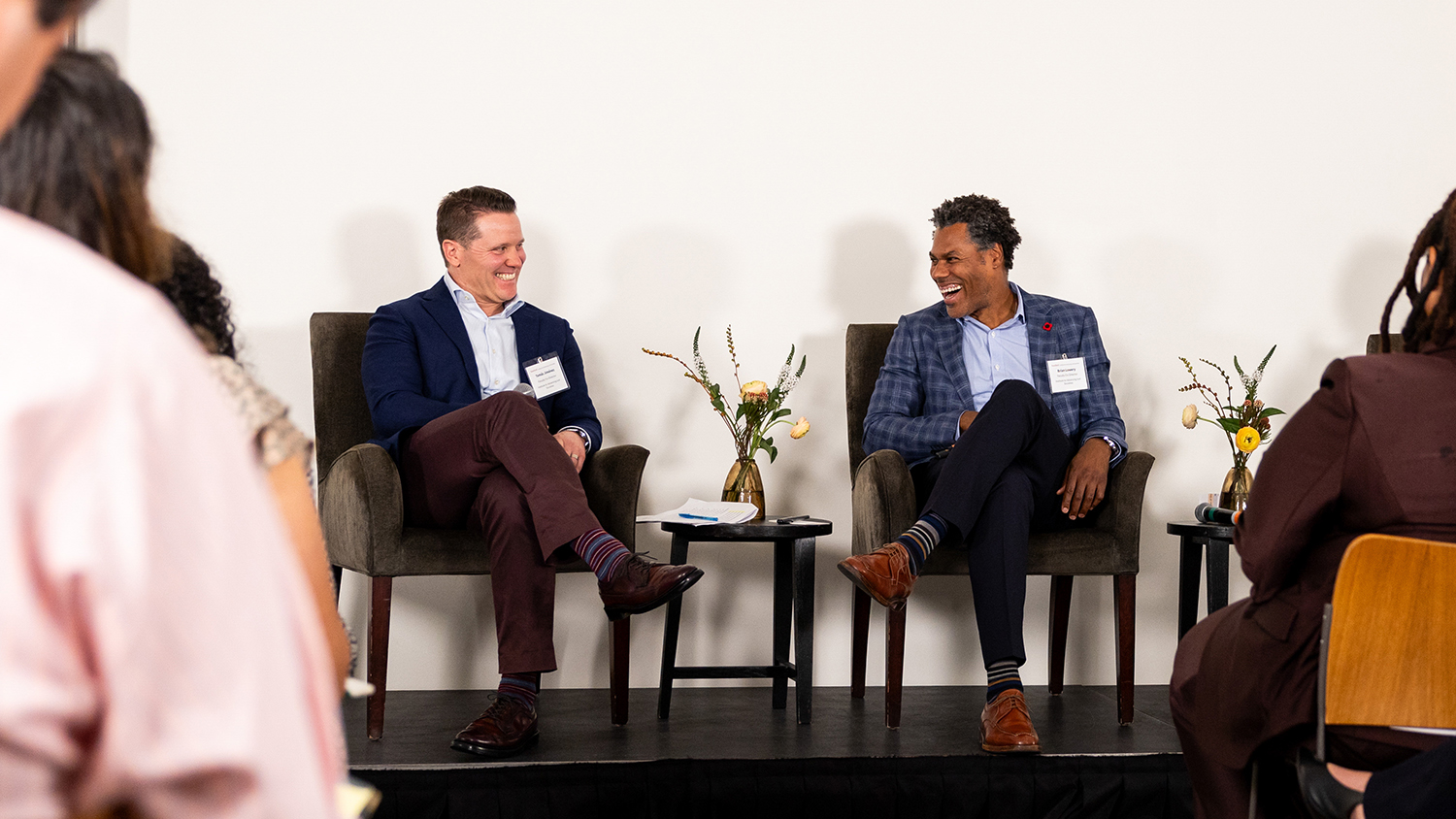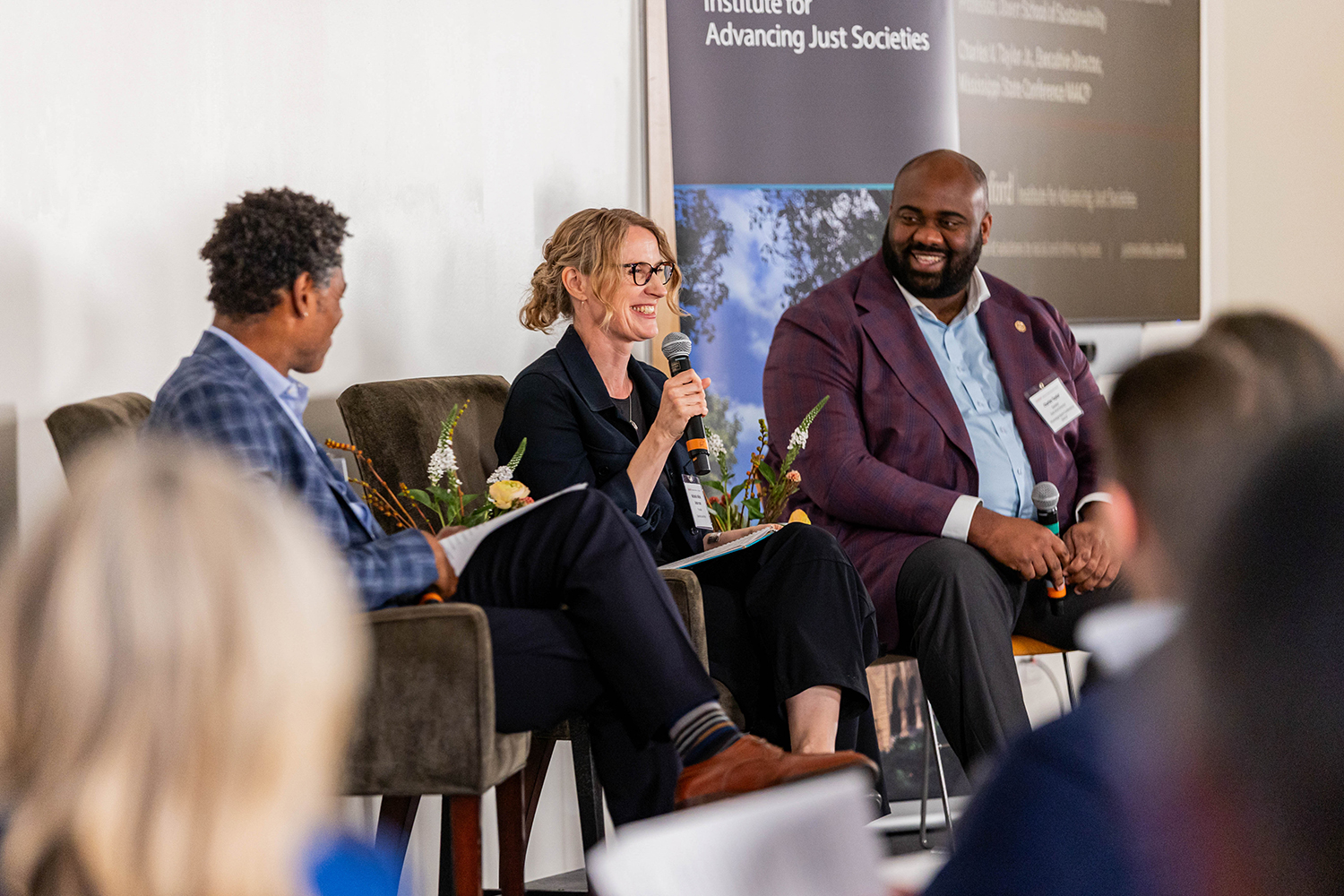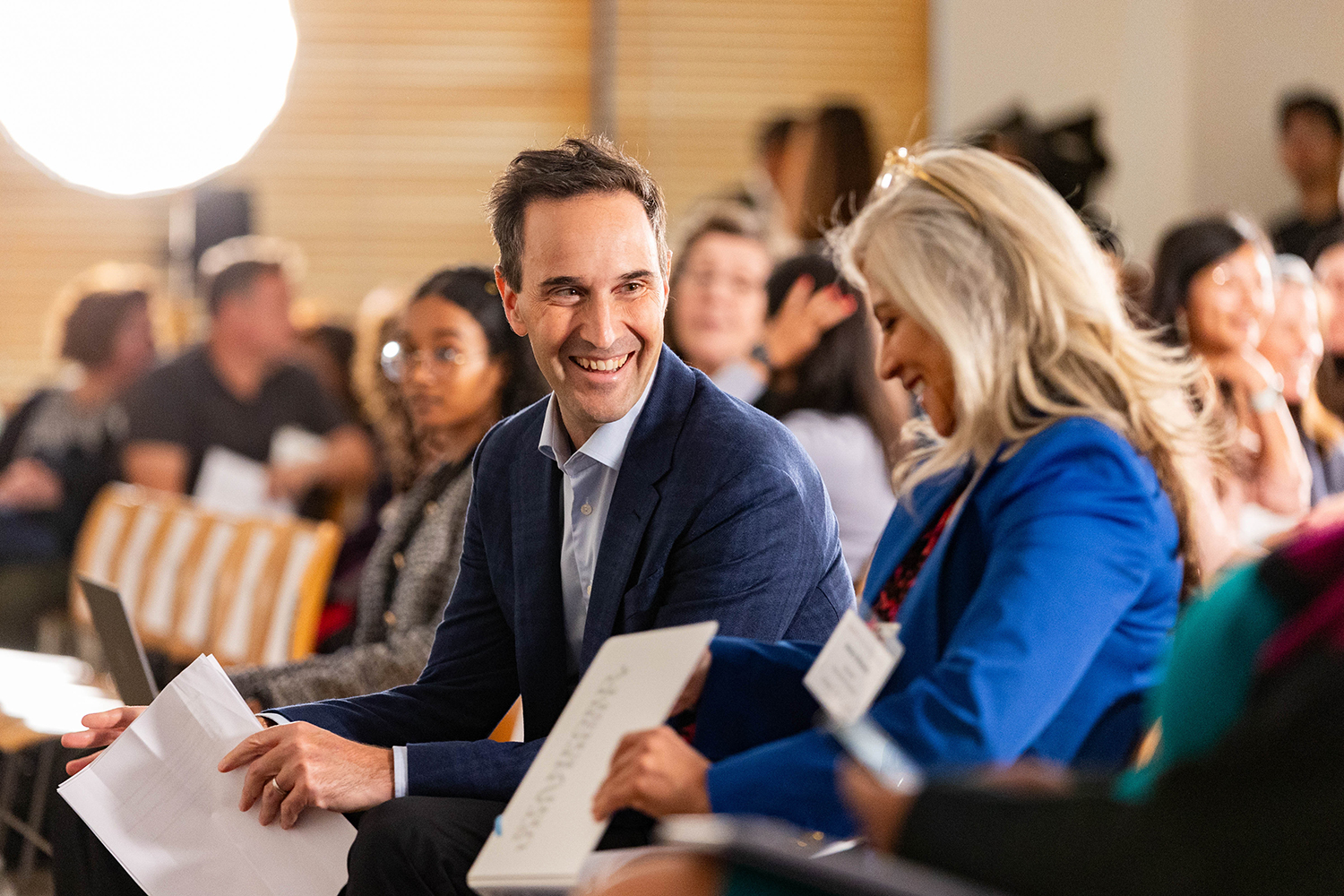At the introductory event of the Institute for Advancing Just Societies, leaders celebrated faculty and community partners, introduced the first cohort of fellows, and shared the institute’s vision and upcoming programs with the campus community. The event was held Oct. 15 in the Frances C. Arrillaga Alumni Center.
Stanford President Jonathan Levin welcomed attendees and thanked those who had worked to make the institute a reality since it was first envisioned in 2020.
“The approach this institute has taken is particularly exciting because it envisions an opportunity to have faculty from many different disciplines be part of the efforts here, it envisions having partnerships that go beyond the university, it envisions having impact out in the world, and it’s going to be different than anything in the country,” Levin said.
Remarks by Debra Satz, the Vernon R. and Lysbeth Warren Anderson Dean of the School of Humanities and Sciences, placed the institute’s mission in a broad context.
“If you think about all the challenges we face – as individuals, as a nation, and as members of a shared planet – climate change, war, mass migration, poverty, and inequality – they are riven through with issues about race and difference. Living together as equals is an aspiration that still needs to be made real,” Satz said. “It’s especially exciting that the institute will be focused on advancing solutions to these issues.”

Professors Tomás Jiménez (left) and Brian Lowery are founding faculty co-directors of the Institute for Advancing Just Societies. | Anthony Chen/Ethography
Partnerships and programs
One of the institute’s goals is to elevate the work of researchers from across Stanford and connect research on race and ethnicity with the community.
Tomás R. Jiménez, a professor of sociology in the School of Humanities and Sciences and co-director of the institute, said the institute’s approach stands out both for its focus on solutions and for its support for all phases of research, from ideation through dissemination of the results.
“In the social sciences, we’re really good at diagnosing inequity,” Jiménez said. “What we want to amplify is not only the diagnostics but also the solutions.”
Jiménez and Brian S. Lowery, the Walter Kenneth Kilpatrick Professor of Organizational Behavior at Stanford Graduate School of Business, are the institute’s founding faculty co-directors. At the Oct. 15 event, Lowery emphasized that the institute is building its infrastructure, including communications and event planning teams, to support researchers whose work is related to the institute’s mission.
In the social sciences, we’re really good at diagnosing inequity. What we want to amplify is not only the diagnostics but also the solutions.”Tomás R. JiménezProfessor of Sociology in the School of Humanities and Sciences
Attendees heard examples of work the institute’s fellows are undertaking with outside partners to promote practical, research-based solutions to issues of race and ethnicity.
Michelle Wilde Anderson, the Larry Kramer Professor of Law at Stanford Law School and professor of environmental social sciences at the Stanford Doerr School of Sustainability, spoke with Charles V. Taylor Jr., executive director of the Mississippi State Conference NAACP, about ways to resolve what they call “red-state/blue-city gridlock,” with a particular focus on Jackson, Mississippi.
Anderson, a Stanford Impact Labs design fellow, will work with the civic sector, local government, and historically Black colleges and universities in Jackson to find a shared understanding of how the breakdown of the city’s relationship with the state left Jackson with an obsolete water system and other service issues that are driving dramatic population loss.

Michelle Wilde Anderson, the Larry Kramer Professor of Law at Stanford Law School and professor of environmental social sciences at the Stanford Doerr School of Sustainability, spoke with her community research partner Charles V. Taylor Jr., executive director of the Mississippi State Conference NAACP, about ways to resolve what they call “red-state/blue-city gridlock.” The panel discussion was moderated by Brian Lowery, the Walter Kenneth Kilpatrick Professor of Organizational Behavior at Stanford Graduate School of Business. | Anthony Chen/Ethography
“The original idea comes from the observation that state and local governments don’t use the same base facts,” Anderson said. “I think Jackson lacks resources, authority, and capacity. At Stanford, we have a lot of capacity.”
The work could shed light on challenges faced by other Southern cities, as well.
“I think we have paid way too little attention to the problem of the small city Black South, and this incredible disinvestment,” Anderson said.
Dr. Alyce Adams, the Stanford Medicine Innovation Professor and professor of health policy and of epidemiology and population health, spoke with Juanita Waugh, a breast cancer peer navigator with Black Ladies Advocating for Cancer Care, about ways to reduce the cancer burden for Black women.
Adams’ work with Waugh has helped illuminate the importance of involving patients in medical research and treatment decisions.
“It really is this iterative, ongoing, bidirectional process that we go through in our research,” Adams said.
The institute also highlighted several of this year’s initiatives.
Jory Steele, executive director of the institute, spoke with Moira Shourie, executive director of Zócalo Public Square, about a collaborative endeavor to explore the question, “What can become of us?” Together, they will host a year-long, nationwide conversation that explores the future of race and ethnicity in America through art, public programs, and essays.

President Levin and Moira Shourie, executive director of Zócalo Public Square; Zócalo and Stanford are collaborating on public arts events that will inform a national dialogue on race and ethnicity. | Anthony Chen/Ethography
“The inspiration this institute has is to find new ways of talking about race and ethnicity,” Shourie said. “We wondered, how can we harness the power of art to bring about new ways of thinking about an essential question: What will become of us?”
Additionally, Meklit Hadero, the visiting artist sponsored by the institute, performed several songs and attendees learned about the institute’s co-sponsorship of two John S. Knight Journalism Fellows, as well as its sponsorship of two Stanford Impact Labs design fellows, all for the 2024-25 academic year.
Vision for the future
Claude Steele, professor emeritus of psychology, asked the institute’s co-directors during a question-and-answer session how they would define a “just society.”
“What I mean is when you’re born, your opportunities in life are not dictated or limited by the social categories that people apply to you or that you apply to yourself,” Lowery said.

Approximately 125 Stanford faculty and staff members gathered at the Frances C. Arrillaga Alumni Center on Oct. 15, 2024, to hear about the mission, vision, programs, and events planned by Stanford’s Institute for Advancing Just Societies, which was established by the university in December 2022 to seek real-world solutions to racial and ethnic injustice. | Anthony Chen/Ethography
Jiménez noted that Stanford’s commitment to the institute comes at a time when diversity and inclusion efforts are under attack, and some universities have been pulling back from them.
“One of the things that makes us somewhat unique is that although I think there are headwinds out in the culture and in higher education, we as an organization feel like we have the wind at our back at Stanford,” Jiménez said. “We really feel like we have not let up – the foot is still on the gas pedal.”
There’s demand in the world for the kind of research we are doing, the understanding of the world that we live in, and a need to mobilize that understanding to actually make some change.”Tomás R. Jiménez
The co-directors noted that the institute is in the building phase and will be increasing its activities and support for core research this year. This will include the announcement of a multiyear thematic initiative whose theme will be announced soon.
Jiménez said the institute is well positioned to balance both supply and demand for solutions to problems involving race and ethnicity.
“The supply comes from the incredible group of faculty we have on campus who are doing solutions-focused research, who are out in communities doing really amazing work,” Jiménez said. “And there’s demand in the world for the kind of research we are doing, the understanding of the world that we live in, and a need to mobilize that understanding to actually make some change.”
For more information
The Institute for Advancing Just Societies at Stanford University brings together researchers, thought leaders, community partners, and policymakers to develop practical solutions to pressing societal problems involving race and ethnicity. Backed by Stanford’s research capacity and external partnerships, the institute works on a local, national, and global scale to ensure that race and ethnicity no longer adversely impact people’s security, health, freedom, opportunity, political self-determination, or life experience. The institute was founded in 2022 with the goal of developing a cross-disciplinary infrastructure at Stanford for the study of race and ethnicity and their effects on society.